Food poisoning can be scary and sometimes dangerous. But, knowing what to do can help prevent and manage it. This guide will cover the main causes, signs, and treatments for food poisoning. It will also share tips on keeping your digestive health good and avoiding foodborne illnesses.
Key Takeaways
- Food poisoning is a common and often preventable illness caused by consuming contaminated or mishandled food.
- Recognizing the symptoms of food poisoning, such as gastrointestinal distress, is crucial for seeking timely treatment.
- Proper food handling, storage, and hygiene practices can significantly reduce the risk of foodborne illnesses.
- Staying hydrated and replenishing electrolytes are essential for recovery from food poisoning.
- Seeking medical attention is advised if symptoms persist or worsen, especially for high-risk individuals.
Understanding Food Poisoning
Food poisoning is a common issue that can be serious. It has many causes and risk factors. Knowing what causes it helps us prevent and manage it. Let’s look at the main causes, risk factors, and pathogens that lead to foodborne illnesses.
Causes and Risk Factors
Foodborne illnesses come from eating contaminated food or drinks. This contamination can happen at any step in making, processing, or handling food. Things that make you more likely to get food poisoning include:
- Poor food hygiene, like not washing hands well or not storing food right
- Eating foods that are not cooked enough or not pasteurized, which can have harmful bacteria or parasites
- Having a weak immune system, like in older people, pregnant women, or those with ongoing health issues
- Traveling to places with lower food safety standards or food supply chain problems
Common Foodborne Pathogens
Many bacteria, viruses, and parasites can cause foodborne illnesses. Here are some common ones:
| Pathogen | Commonly Associated Foods | Symptoms |
|---|---|---|
| Salmonella | Poultry, eggs, dairy products, raw produce | Diarrhea, fever, abdominal cramps |
| Escherichia coli (E. coli) | Undercooked ground beef, raw produce, unpasteurized milk | Severe diarrhea, abdominal cramps, vomiting |
| Listeria monocytogenes | Deli meats, soft cheeses, raw produce | Fever, muscle aches, gastrointestinal symptoms |
| Norovirus | Contaminated water, raw produce, ready-to-eat foods | Nausea, vomiting, diarrhea |
Knowing about the causes, risk factors, and pathogens of food poisoning is key. It helps us prevent it and get the right medical care when needed.
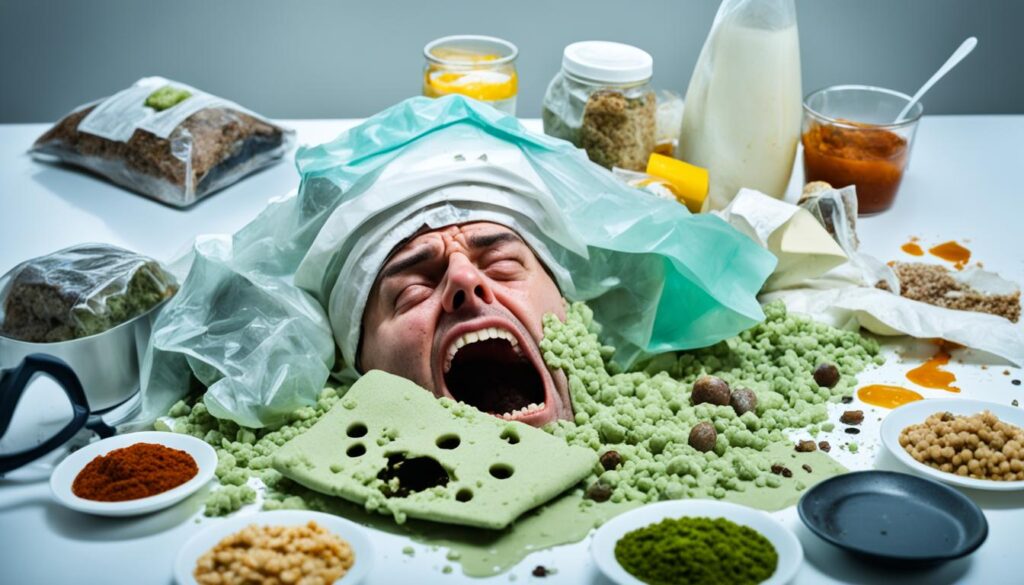
Recognizing the Symptoms
Knowing the signs of food poisoning is key to getting help fast and handling it well. Common signs include nausea, vomiting, diarrhea, and stomach cramps.
Gastrointestinal Distress
Symptoms usually start within 1 to 3 days after eating bad food or drinks. How fast they start can depend on the germ causing the illness. Some germs make symptoms appear quicker than others.
The severity and how long symptoms last can vary a lot. It can be mild or very bad, affecting your daily life.
Nausea and vomiting are big signs of food poisoning. They can make you lose fluids and upset your body’s balance of minerals. Diarrhea also leads to losing fluids and minerals, making things worse.
Stomach cramps are another clear sign. They can feel sharp or like a bad pain in your belly. You might also feel bloated or uncomfortable in your stomach.
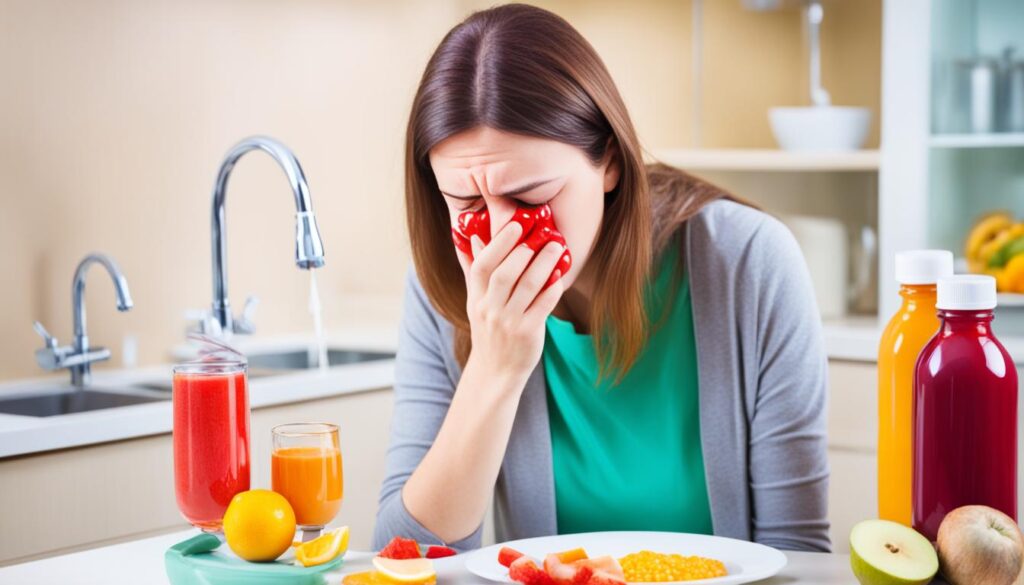
The severity and how long symptoms last can change a lot. It depends on the germ, your body’s defense, and how much bad food or drink you had. If symptoms get worse or don’t go away, see a doctor. Also, if you’re getting dehydrated, have a high fever, or notice other serious signs, get help right away.
food poisoning symptoms, foodborne illness, food safety, digestive health
Food poisoning can be a tough and uncomfortable experience. It’s important to know the symptoms and how they affect your digestive health for quick recovery. When you eat contaminated food, your body starts to fight back, causing stomach issues.
Symptoms of food poisoning include nausea, vomiting, diarrhea, stomach cramps, and fever. These symptoms can be mild or severe and last from a day to over a week. The type of germ and your immune system play a big role in how bad it gets.
Keeping your digestive health in check is key when you have food poisoning. The balance of good bacteria in your gut can get upset by harmful germs. Eating right and staying hydrated can help fix this balance and make you feel better faster. It can also help prevent future food poisoning.
| Symptom | Severity | Duration |
|---|---|---|
| Nausea | Mild to Severe | 1-3 days |
| Vomiting | Mild to Severe | 1-2 days |
| Diarrhea | Mild to Severe | 1-7 days |
| Abdominal Cramps | Mild to Severe | 1-5 days |
| Fever | Mild to Moderate | 1-3 days |
Knowing about food poisoning symptoms and their effects on your digestive health helps you prepare and recover. It can lessen the impact of foodborne illness.

Preventing Contamination
Keeping food clean and stored right is key to avoiding contamination and foodborne illnesses. By sticking to these tips, you can make sure the food you prepare is safe and tasty at home or when eating out.
Food Handling and Storage Guidelines
To cut down on contamination, follow these important guidelines for handling and storing food:
- Wash your hands well with soap and water before and after touching food.
- Keep raw and cooked foods apart to stop germs from spreading.
- Cook food until it reaches the right temperature to kill harmful germs.
- Put perishable foods in the fridge quickly and keep it at the right temperature.
- Don’t let food sit at room temperature for over two hours (one hour if it’s very hot).
- Clean and sanitize all surfaces, utensils, and tools used for food.
By sticking to these rules, you can stop germs from spreading and keep your family safe from food poisoning.
| Food Handling Guideline | Recommended Practice |
|---|---|
| Handwashing | Wash hands with soap and water for at least 20 seconds, especially before and after handling food. |
| Food Separation | Keep raw and cooked foods separate to prevent cross-contamination. |
| Cooking Temperatures | Cook foods to the recommended internal temperatures to kill harmful bacteria. |
| Refrigeration | Refrigerate perishable foods at 40°F or below and freezer items at 0°F or below. |
| Time at Room Temperature | Avoid leaving food at room temperature for more than 2 hours (1 hour if above 90°F). |
| Cleaning and Sanitizing | Clean and sanitize all food preparation surfaces, utensils, and equipment. |
By using these food handling guidelines and food hygiene measures, you can stop contamination and keep your family safe from foodborne illnesses.
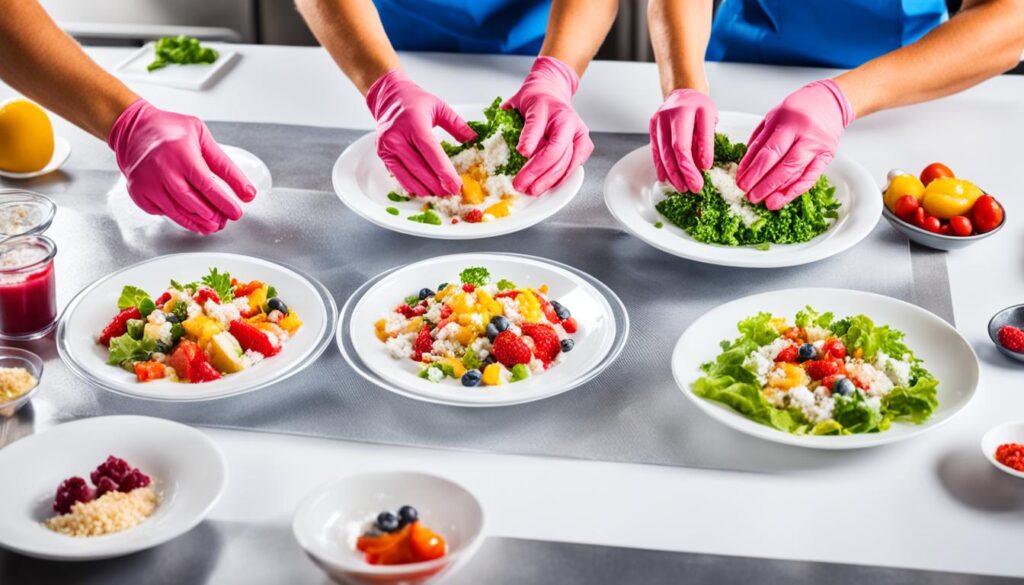
First Aid for Food Poisoning
If you’re feeling the bad effects of food poisoning, act fast to ease your discomfort and stop things from getting worse. Here’s what you should do:
- Stay hydrated: Drink lots of clear fluids like water, broth, or drinks with electrolytes to replace what you’ve lost from vomiting and diarrhea.
- Manage nausea and vomiting: Have small amounts of water or ice chips to calm your stomach. Don’t eat solid food until you stop vomiting.
- Relieve diarrhea: You might want to take an over-the-counter medicine for diarrhea, but don’t if you have a fever or see blood in your stool.
- Ease abdominal discomfort: Use a warm compress or take a warm bath to help with stomach cramps and pain.
- Get plenty of rest: Let your body heal by resting as much as you can.
These first aid steps can help, but watch how bad your symptoms get. If they don’t get better or get worse, you should see a doctor. Getting medical help quickly is important for getting the right treatment and avoiding serious problems from food poisoning.

“The key to recovering from food poisoning is to address the immediate symptoms and prevent dehydration, while also seeking medical attention if necessary.”
| Symptom | First Aid Recommendation |
|---|---|
| Nausea and vomiting | Small, frequent sips of water or sucking on ice chips |
| Diarrhea | Consider taking an over-the-counter anti-diarrheal medication (unless fever or blood in stool) |
| Abdominal discomfort | Apply a warm compress or take a warm bath |
| Dehydration | Drink plenty of clear fluids, such as water, broth, or electrolyte-rich beverages |
By using these first aid tips for food poisoning, you can help ease your symptoms and support your body’s healing. Always get medical help if your symptoms don’t get better or get worse. This is key for your health and well-being.
Hydration and Electrolyte Balance
Keeping your body hydrated and balanced with electrolytes is key when you’re recovering from food poisoning. When you have stomach issues, you can lose water and important minerals fast. It’s vital to get these fluids and nutrients back to feel better and heal quicker.
Replenishing Fluids and Nutrients
To get your hydration and electrolyte levels back up, drink more fluids. Go for small amounts of water, broth, or drinks with electrolytes like sports drinks or coconut water. Stay away from drinks with caffeine or alcohol as they can dry you out more.
- Drink plenty of water, broth, and electrolyte-rich beverages
- Avoid caffeinated and alcoholic drinks
- Consume foods rich in electrolytes, such as bananas, avocados, and leafy greens
- Consider taking over-the-counter oral rehydration solutions to replenish fluids and electrolytes
Eating foods high in electrolytes is also crucial. Think about eating bananas, avocados, and leafy greens. For really bad dehydration, you might want to try over-the-counter solutions to get back on track fast.
| Electrolyte | Food Sources | Importance |
|---|---|---|
| Sodium | Salts, broths, sports drinks | Helps maintain fluid balance and muscle function |
| Potassium | Bananas, avocados, spinach | Supports nerve and muscle function |
| Magnesium | Nuts, seeds, whole grains | Involved in over 300 bodily processes |
By focusing on replenishing fluids and nutrients, you can help restore your hydration and electrolyte balance. This will ease the discomfort of food poisoning.

Over-the-Counter Remedies
When you’re dealing with food poisoning, over-the-counter (OTC) meds can be a big help. These easy-to-find remedies can ease the discomfort of food-borne illnesses. They let people find some relief while they get better.
Anti-nausea meds are a common choice for food poisoning. Things like Dramamine or Emetrol can cut down on nausea and vomiting. This makes it easier to keep fluids and food down. Anti-diarrheal meds, such as Imodium or Pepto-Bismol, help control the loose stools that come with food poisoning.
For belly cramps or general discomfort, pain relievers like acetaminophen or ibuprofen can ease the pain. These meds help with the aches and pains that come with food poisoning.
But remember, OTC remedies shouldn’t replace seeing a doctor if symptoms get worse or don’t go away. Always talk to a healthcare professional if you have severe dehydration, a high fever, or other serious signs.
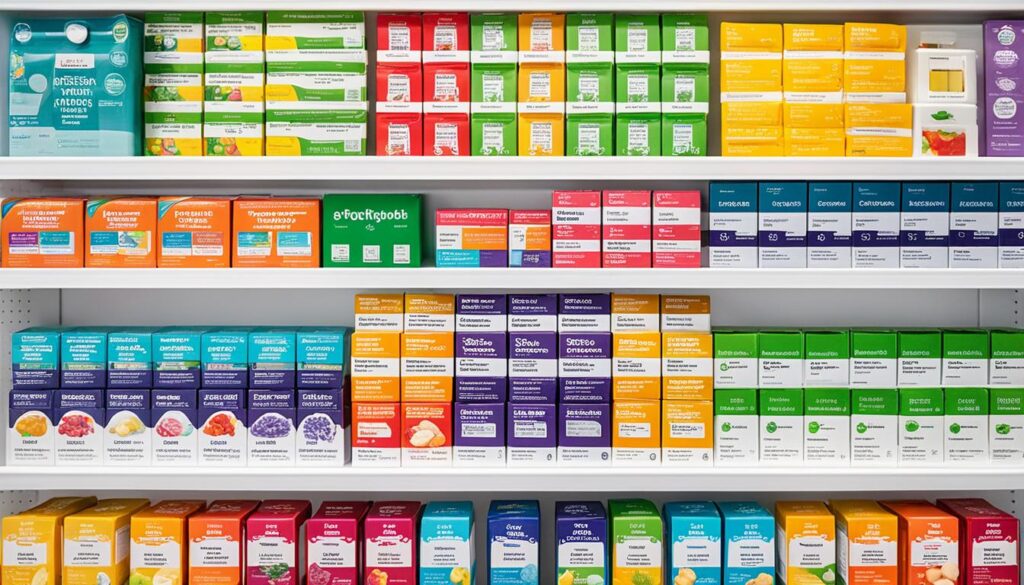
“When it comes to managing the unpleasant symptoms of food poisoning, over-the-counter medications can be a game-changer in providing much-needed relief and comfort.”
Knowing about OTC options and using them wisely can help you tackle the effects of food-borne illnesses. This lets you focus on getting better and feeling good again.
When to Seek Medical Attention
Food poisoning can often be treated at home with rest, hydration, and over-the-counter remedies. But, some warning signs and complications need immediate medical help. Knowing when to get professional help is key to avoid making things worse or causing long-term health issues.
Warning Signs and Complications
If you notice any of these symptoms, you should get medical help right away:
- Severe, persistent vomiting or diarrhea that lasts more than 2 days
- Bloody vomit or diarrhea
- Dehydration, shown by extreme thirst, dry mouth, dizziness, or dark urine
- High fever (over 101°F or 38.3°C)
- Severe abdominal pain or cramps
- Neurological symptoms like blurred vision, muscle weakness, or tingling in the hands and feet
These signs could mean serious issues, like dehydration, electrolyte imbalances, or severe conditions like hemolytic uremic syndrome or botulism. Getting medical help quickly can stop these problems and help you recover fully.
| Symptom | Potential Complication |
|---|---|
| Severe, persistent vomiting or diarrhea | Dehydration, electrolyte imbalances |
| Bloody vomit or diarrhea | Hemolytic uremic syndrome |
| High fever | Sepsis, meningitis |
| Neurological symptoms | Botulism, Guillain-Barré syndrome |
By spotting the warning signs and getting medical help when needed, you can stop serious issues and recover quickly from food poisoning.
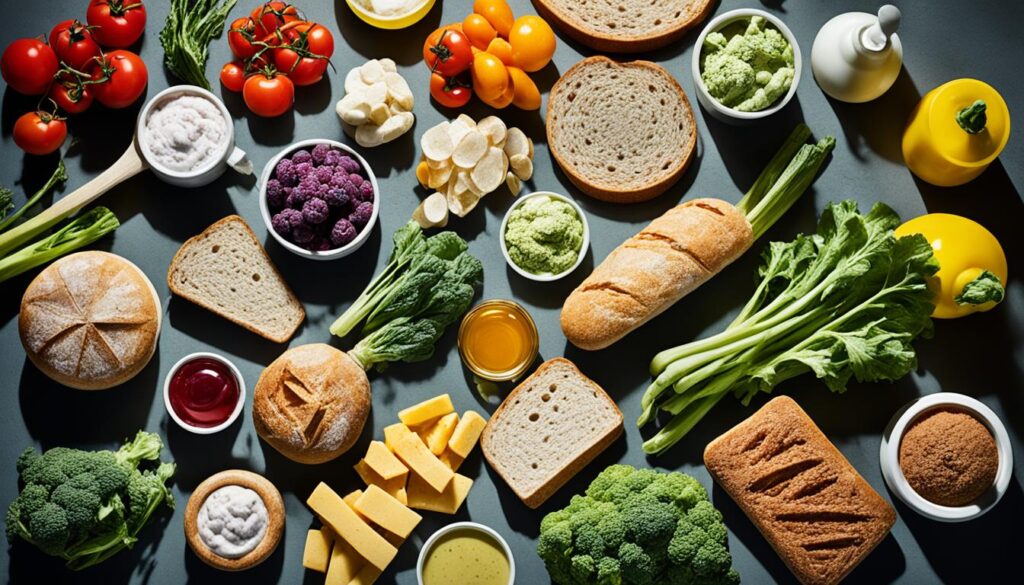
Foodborne Illness Prevention
Keeping your kitchen safe is key to avoiding foodborne illnesses. By following proper hygiene and safety steps, you can cut down on food contamination risks. This helps lower the chance of getting food poisoning.
Kitchen Hygiene and Safety Practices
Keeping your kitchen clean and organized is vital for avoiding foodborne illnesses. Here are some important steps to follow:
- Wash your hands with soap and warm water before and after touching food, and after going to the bathroom.
- Clean all surfaces, cutting boards, and utensils with disinfectant before and after use.
- Keep raw and cooked foods separate to avoid contamination.
- Cook food to the right temperature to kill harmful bacteria.
- Put perishable foods in the fridge quickly and keep them at the right temperature.
- Clean and sanitize your kitchen appliances, like the fridge and oven, regularly.
| Best Practices for Kitchen Hygiene | Best Practices for Kitchen Safety |
|---|---|
| Frequent handwashing | Proper food storage |
| Disinfecting surfaces and utensils | Cooking to safe internal temperatures |
| Separating raw and cooked foods | Regular cleaning and maintenance |
Using these foodborne illness prevention tips and kitchen hygiene and safety practices can greatly lower the risk of foodborne illnesses. This ensures a healthy, safe, and fun dining experience.
Recovering from Food Poisoning
Getting over food poisoning is tough, but you can get your digestive health back. Be patient, listen to your body, and slowly add foods back into your diet.
Restoring Digestive Health
Start by giving your digestive system a break. Drink clear liquids like water, broth, or drinks with electrolytes to stay hydrated. Then, slowly add solid foods back in, starting with things like bananas, rice, applesauce, and toast.
- Avoid dairy, fatty, and spicy foods, as they can be harder to digest during the recovery process.
- Incorporate probiotic-rich foods like yogurt, kefir, or fermented vegetables to help restore the balance of healthy gut bacteria.
- Stay away from caffeine, alcohol, and tobacco, as they can further irritate your digestive system.
As you restore your digestive health, pay attention to how you feel. It might take a few days or weeks to get your appetite and energy back. Be patient and listen to your body.

The path to recovery varies for everyone. By focusing on your own needs and making slow, careful changes, you can beat food poisoning. You’ll come out with a stronger, healthier digestive system.
Pregnancy and Food Poisoning
Expectant mothers face unique challenges with food poisoning during pregnancy. They are more likely to get sick from food. It’s important to take extra care to keep both the mom and the baby safe.
Some foodborne pathogens, like Listeria monocytogenes, can harm the fetus. This can cause miscarriage, stillbirth, or serious health problems for the newborn. Dehydration and electrolyte imbalances from food poisoning can also be dangerous, leading to preterm labor or other issues.
Pregnant women need to be careful with food handling and preparation. Make sure to cook all foods well. Avoid raw or undercooked meat, seafood, and eggs. Always practice good hygiene when handling food.
If you get food poisoning while pregnant, see a doctor right away. Symptoms like severe vomiting, diarrhea, or fever need quick attention. Healthcare providers may give you antibiotics or fluids to help you and your baby.
Rest and hydration are also key for recovery and preventing more problems.
By knowing the risks and taking steps to stay safe, pregnant women can protect themselves and their babies from food poisoning. Being careful with food safety and getting medical help when needed can help ensure a healthy pregnancy and birth.
High-Risk Groups and Precautions
Some people are more likely to get very sick from food poisoning. It’s important to know who these groups are and how they can stay safe. This helps prevent serious health issues.
Older adults, young kids, and people with weak immune systems are at higher risk. Those with health conditions like diabetes, liver problems, or cancer are also more likely to get foodborne illnesses. These groups need to be extra careful with how they handle and eat food.
To keep these individuals safe, following strict food safety rules is key. This means washing hands well, cooking food properly, and storing food safely. It’s also important to check for food recalls and avoid bad products.
By being proactive and spreading the word, we can protect those most at risk from food poisoning. Remember, prevention is key when it comes to protecting the most vulnerable members of our community.
“Food poisoning can have serious consequences, especially for high-risk individuals. Adopting proven food safety practices is the best way to keep these groups safe and healthy.”
High-Risk Groups for Food Poisoning
- The elderly
- Young children
- Individuals with compromised immune systems
- Those with underlying medical conditions (e.g., diabetes, liver disease, cancer)
Precautions for High-Risk Individuals
- Maintain strict hand hygiene practices
- Ensure thorough cooking of all food items
- Carefully store perishable foods at the appropriate temperatures
- Stay informed about food recalls and avoid contaminated products
- Consult with healthcare providers for personalized guidance
Food Safety Tips for Dining Out
When eating out or getting takeout, keeping food safe is key to staying healthy. I’ve picked up some important tips to spot and avoid risks in restaurants and food delivery.
Restaurant and Takeout Precautions
First, I check the restaurant’s safety and cleanliness record before choosing where to eat or order from. I look at reviews, sanitation scores, and any health issues. I also check how clean the place looks and how the staff handles food.
For takeout, I make sure the food is packed right and stays at the right temperature during delivery. When I get the food, I check it for any signs of going bad or being dirty. Being careful and informed helps me avoid food safety tips for dining out or restaurant and takeout precautions when eating out.



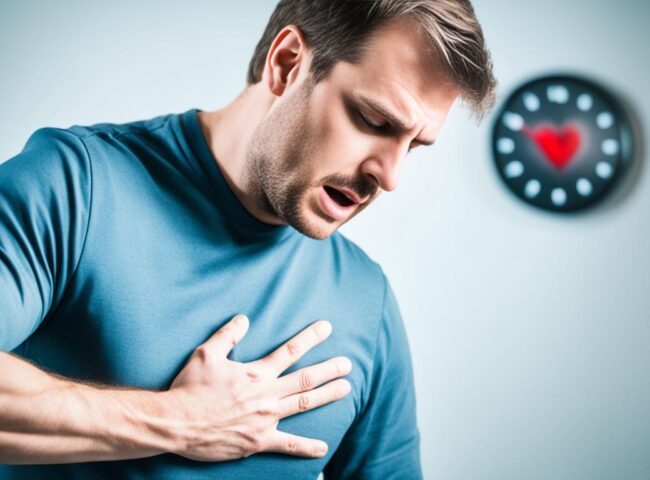


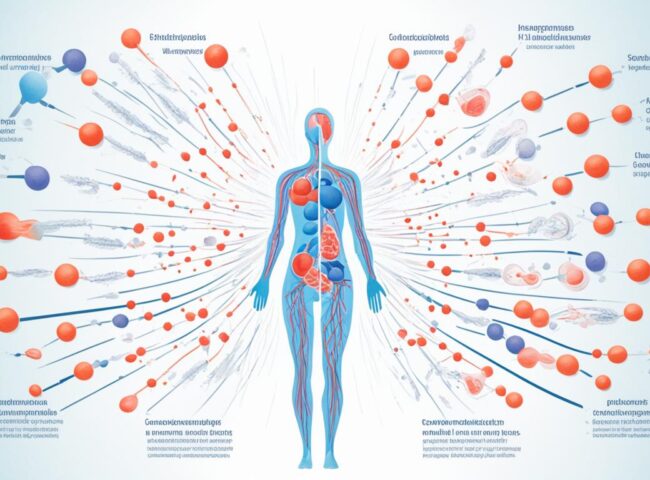
Leave feedback about this